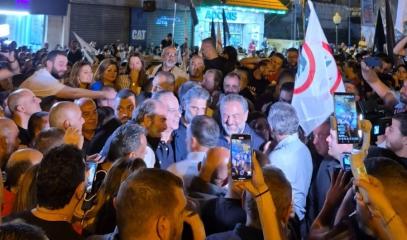Lebanese local elections: First ‘success’ for the new government
Low turnout in some areas (a meagre 21% in the capital) and the absence of a national vision on decentralisation stand out as key challenges. These factors continue to hinder the emergence of a truly autonomous local authority. Nonetheless, the vote marks a positive step in view of the 2026 parliamentary elections.
Beirut (AsiaNews) – Just months after the end of the devastating war between Israel and Hezbollah — which came to a close under military coercion in November 2024 — and four months after the election of President Joseph Aoun on 9 January, Lebanon’s new government has successfully organised long-delayed municipal elections. Given the circumstances and how the process unfolded, the elections can justifiably be regarded as a success for the new administration. The vote, originally postponed in 2022 and rescheduled in stages for logistical reasons, has taken place over three consecutive Sundays in May.
The previous round of municipal elections in Lebanon was held in 2016. These local councils serve six-year terms, meaning this year’s elections were three years overdue. The final phase is scheduled for next Sunday, 25 May, covering southern Lebanon, including villages devastated by Israeli strikes. Inhabitants of those areas will vote outside their home municipalities — yet still, as has become the norm, under the ever-watchful and at times deadly gaze of drones.
One of the key takeaways from this electoral process — beyond the formal success — is the ongoing lack of a national policy for decentralisation. This continues to prevent the rise of a truly autonomous local governance structure, capable of pursuing collective goals beyond narrow partisan interests. As such, these municipal elections serve as a dress rehearsal for the crucial parliamentary elections scheduled for May 2026, a pivotal moment in a country where political division — driven in part by Hezbollah’s armed presence — still dominates institutional life.
The largest segment of the municipal vote took place on Sunday, 18 May, in Beirut and in the governorates of Bekaa and Baalbeck. Over one million voters were eligible to cast their ballots. Turnout in the capital was a dismal 21%, compared to a more respectable 45% in the Bekaa. This stark contrast offers a telling insight: the capital’s electorate is increasingly disenchanted and disillusioned with the prospect of meaningful change.
In Beirut — a predominantly Sunni city, where the community represents over 50% of the electorate — victory went to a mixed slate led by MP Fouad Makhzoumi. Interestingly, this alliance received support from both the Lebanese Forces and the Shiite tandem of Hezbollah and the Amal Movement — a seemingly unnatural coalition. Makhzoumi’s declared aim, 90% achieved, was to elect a 24-member council observing symbolic Christian-Muslim parity — a principle introduced by Rafic Hariri after the civil war, though not enshrined in the municipal electoral law.
Makhzoumi’s gamble nearly paid off. His list was narrowly defeated by that of Mahmoud el-Jamal, a former officer linked to the Future Movement. The result was widely celebrated on the streets as a “Sunni victory” against a cross-sectarian alliance that, despite its good intentions, ultimately owed its strength to Shiite votes.
Analysts see this outcome as an echo of Hezbollah’s 2008 show of force against Sunni areas — a move that cemented the Party of God’s political dominance until its costly war with Israel in 2023–24. The pro-Iranian movement continues to challenge the will of the majority of Lebanese and has refused to acknowledge its grave error in unilaterally initiating hostilities with Israel on 8 October 2023 in support of Hamas. That decision led to Hezbollah’s military defeat and the further devastation of Lebanon at the hands of Israel’s armed forces.
The Beirut vote also marked a decline in influence for MPs and NGOs that emerged from the 2019 protests (notably "Beirut Madinati"), signalling — perhaps only temporarily — the fading of yet another hope for change.
Lebanese Forces Victory in Zahlé
Outside the capital, 18 May also brought a clear victory for the Lebanese Forces in Zahlé, the major Christian city in the Bekaa. This mirrored the dominance of the Shiite coalition in the largely Shiite districts of Baalbeck and Hermel — though analysts noted a waning of Hezbollah’s popular control, with turnout falling compared to 2016.
The first two phases of the municipal elections took place on 4 May in Mount Lebanon and on 11 May in North Lebanon. Voter participation was moderate and below 50%, except in Koura (59.4%) and Jbeil (56.7%). The abstention trend seen in Beirut was also evident in urban areas like Metn and Baabda.
In Metn, Baabda, and parts of Kesrouan — predominantly Christian areas — voters expressed fatigue with party politics and instead favoured candidates with a focus on practical governance issues such as waste management, street lighting, and infrastructure. The vote count revealed a fragmented landscape: no party was able to claim dominance in Mount Lebanon. The Free Patriotic Movement (FPM), the Lebanese Forces, the Kataeb Party, and various independent lists scored isolated victories in symbolic municipalities. As a result, the political picture remains characterised by fragmentation, local deals, and ad hoc alliances — all typical of municipal elections.
Scandal in Tripoli
In North Lebanon, the most contentious voting took place in Tripoli, a Sunni-majority city. There, it took three days to announce results amid a tense atmosphere rife with allegations of fraud. The municipal council’s 24 seats were shared between slates backed by MP Ashraf Rifi and former Prime Minister Najib Mikati. However, the chaos surrounding the count led to the dismissal of the local governor, Ramzi Nohra, who was held responsible for the turmoil.
Finally, the army made at least 86 arrests following celebratory gunfire after the results were announced — gunfire that left journalist Nada Andraos of LBCI injured, along with a young man who remains in critical condition.
GATEWAY TO THE EAST IS THE ASIANEWS NEWSLETTER DEDICATED TO THE MIDDLE EAST. WOULD YOU LIKE TO RECEIVE IT EVERY TUESDAY? TO SUBSCRIBE, CLICK HERE.









.png)










